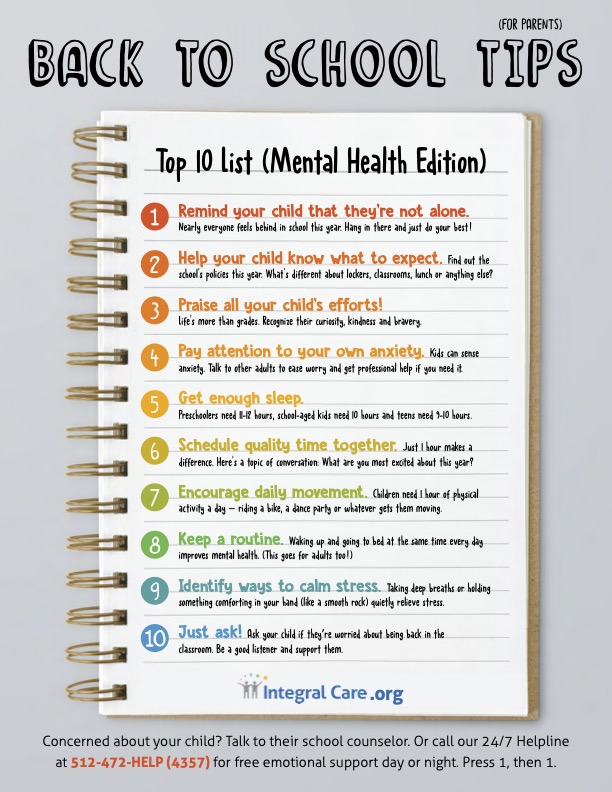As kids across Texas head back to school, stress and anxiety can rise for parents, caregivers, and students alike. Mental health plays a pivotal role in how students cope with school demands, from managing academic pressures to navigating social interactions. For caregivers, understanding and addressing their children’s mental health needs can make a significant difference in their ability to adapt and flourish during this time.
In this final blog post of our summer series, we’ll cover how parents and caregivers can support their kid’s mental wellness as they prepare to go back to school. Along with tips, we’re highlighting virtual webinars, support groups for families, and resources for parents, caregivers, and youth.
Texas Systems of Care (TxSOC) is committed to supporting youth mental health by sharing resources and creating access to services for children, youth, and young adults with or at risk for mental health challenges. Our goal is to equip caregivers with the tools and knowledge necessary to promote a healthy mental state for their children, ensuring a successful and enjoyable start to the new school year!

Ways You Can Prepare Your Child’s Mental Wellness for Back-to-School
The start of school for many students causes some nervousness and anxiety. As parents and caregivers, you want to create a supportive environment for kids to share their emotions and feel ready to get back to their school routines. We hope these approaches will help you feel confident in preparing your child for the new year!
Integral Care created this resource guide with 10 Tips for Back to School for parents to support children’s mental health. Download the PDF and share it with other parents!

Back to School Supplies and Resources
Part of the back-to-school stress for parents and caregivers is getting the school supplies ready. Fortunately, there are many resources that contribute to kids’ school supplies!
Tax Free Weekend for School Supplies: August 9 – 11 is Tax-Free weekend in Texas! Only the school supplies on this list priced under $100 qualify for exemption from tax during the sales tax holiday. View the list here.
Find Back to School Supplies Near You:
Several organizations across Texas regions are providing free backpacks and school supplies to youth preparing to go back to school. Check your local news for organizations near you!
Virtual Events and Support Groups for Families and Caregivers
Remember that you’re not alone in this transition. If you’re looking for community and want to hear from others in similar situations or you have questions for mental health professionals, there are support groups you can attend virtually! Virtual events are also a great way to get educated on mental health topics and connect with community.
August PACT Session: Peers and Clinicians Together (PACT) is a free monthly series where you can ask anything that’s on your mind of a mental health clinician and peer support! Anyone can attend.

Available Mental Health Resources:
As the school year continues, you may find you or your child are working through mental health issues. There are tons of local and national mental health resources that were developed to help youth, families, young adults, and all. We created a comprehensive list to help you find the support you need:
- National Institute of Mental Health (NIH): Here you can find educational posts about a variety of mental health topics such as depression, substance use and co-occurring mental disorders, and therapies.
- Texas Health and Human Services Commission (HHSC): HHSC contracts with 37 local mental health authorities and two local behavioral health authorities to deliver mental health services across Texas. You can put in your zip code to locate services in your area. They also offer mental health and substance use resources.
For youth under 18
- Navigate Life Texas: This site provides information and resources for families of children and young adults with disabilities or special healthcare needs in Texas. You’ll find resources related to education, healthcare, legal services, financial assistance, community forums, and more.
Helplines
- 988 National Suicide Prevention Lifeline: The Lifeline provides 24/7, free and confidential support for people in distress, prevention and crisis resources for you or your loved ones, and best practices for professionals in the US.
- 2-1-1 Texas: No matter where you live in Texas, you can dial 2-1-1, or (877) 541-7905, and find information about resources in your local community. You can get help with food, housing, child care, crisis counseling, substance abuse treatment, and more.

As the back-to-school season unfolds, we hope you’ll consider these suggestions and resources. Prioritizing mental health is an essential step towards ensuring your child’s success and well-being. TxSOC is here to continue to share resources, events, and community support to help your family succeed.
Let’s Stay Connected!
Subscribe to the Texas Systems of Care (TxSOC) newsletter for the latest updates, valuable resources, and tips to support your family’s mental health.
Follow us on social media to receive timely advice, event announcements, and to join a community dedicated to the well-being of our children.
Share this blog post with other caregivers and families to spread awareness and ensure that everyone has access to the support they need. Together, we can create a stronger, more resilient community for our children to thrive in.
Leave a Reply